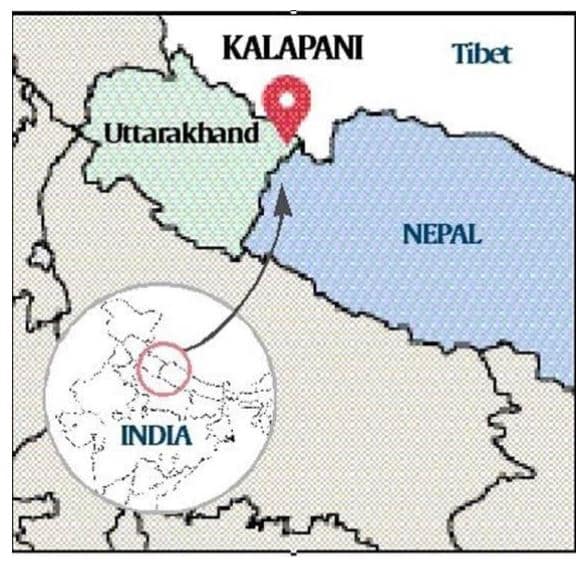UPSC Articles
Nepal PM positive of resolving all ‘pending issues’ with India
Part of: GS International and GS-II – India’s Foreign relations
In news:
- Nepal Prime Minister said bilateral disputes with India should be dealt with dialogue, indicating Kathmandu’s political willingness to resolve the row over the Kalapani territorial issue.
- The Kalapani issue was reignited after India published a new political map in November 2019 that displayed its continued position over the territory as part of Uttarakhand.
From Prelims Point of view:
Kalapani territorial issue:
- Kalapani is a valley that is administered by India as a part of the Pithoragarh district of Uttarakhand. It is situated on the Kailash Mansarovar route.
- The Kali River in the Kalapani region demarcates the border between India and Nepal.
- The Treaty of Sugauli signed by the Kingdom of Nepal and British India (after Anglo-Nepalese War) in 1816 located the Kali River as Nepal’s western boundary with India.
- Kalapani has been controlled by India’s Indo-Tibetan Border Police since the Sino-Indian War with China in 1962
- The discrepancy in locating the source of the river led to boundary disputes between India and Nepal, with each country producing maps supporting their own claims.

Daily Current Affairs IAS | UPSC Prelims and Mains Exam – 22nd January 2020
Miscellaneous Topics in News
All Assam Students’ Union
- All Assam Students’ Union or AASU is a students’ organisation in Assam
- Known for leading the six-year Assam Movement against illegal immigrants from Bangladesh.
- It formed a political party Asom Gana Parishad (AGP), which formed government in Assam twice.
Coronaviruses (CoV)
- Coronaviruses (CoV) are a large family of viruses that cause illness ranging from the common cold to more severe diseases such as Middle East Respiratory Syndrome (MERS-CoV) and Severe Acute Respiratory Syndrome (SARS-CoV).
- A novel coronavirus (nCoV) is a new strain that has not been previously identified in humans. Some transmit easily from person to person, while others do not.
- spreading through of contact with animals, contaminated food, and/or person-to-person.
Trillion Tree Campaign
- In 2006, the Billion Tree Campaign was launched, by the United Nations Environment Programme (UNEP) as a response to the challenges of global warming, as well as to a wider array of sustainability challenges from water supply to biodiversity loss
- The Billion Tree Campaign was inspired by Nobel Peace Prize Laureate Wangari Maathai, founder of the Green Belt Movement.
- WWF, the Wildlife Conservation Society and BirdLife International today launched the Trillion Trees programme, a new 25-year initiative to help scale global forest commitments and spur greater ambitions towards protecting and restoring one trillion trees by 2050
- During the World Economic Forum 2020 in Davos, World Economic Forum announced a platform for governments, businesses, civil society to support UN Decade on Ecosystem Restoration 2021-2030, led by UNEP and FAO
Buriganga river
- Bangladesh’s High Court has asked authorities to shut down 231 factories surrounding the highly polluted Buriganga river
- The Buriganga River is a river in Bangladesh that ranks among the most polluted rivers in the country.
Fast-moving consumer goods (FMCG)
- FMCG grew at 9.7% in 2019, much lower than the previous year’s growth of 13.5%.
- Fast-moving consumer goods (FMCG) are products that are sold quickly and at a relatively low cost.
- Examples include non-durable household goods such as packaged foods, beverages, toiletries, over-the-counter drugs, and other consumables











